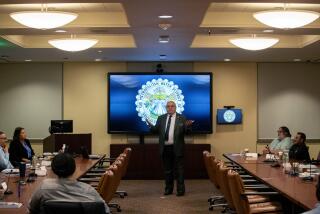Freeman ‘Surprised’ at Alleged Gouging by DWP
SACRAMENTO — State power official S. David Freeman on Thursday deplored an alleged act of price gouging during the energy crisis by the Los Angeles city power department he once headed, but claimed it was not as bad as a similar scheme by the Enron Corp.
Freeman, former general manager of the city Department of Water and Power, told state Senate investigators that he had no knowledge of the incident of “ricocheting” in 2000 until he read of it in The Times last month.
In his deposition, Freeman testified he was “surprised and disappointed” by what appeared to be the exercise of market tactics by department energy traders that violated his standing orders for employees to avoid anything that “comes anywhere close to violating [marketing] rules or is in any way manipulative.”
“It was a bad thing. It should not have been done,” Freeman said. But he insisted that adverse effects were relatively minor and “not of the same order of magnitude as the Enron type” of ricochet manipulation.
Freeman, an expert on public power for almost 30 years, was appointed by Gov. Gray Davis last August to the $220,000-a-year position as chief of the newly created state public power authority. However, his confirmation to the post has drawn fire from Senate Republicans, who challenged his fitness to serve. At the insistence of Republicans, Freeman’s confirmation by the full Senate has been held up, at least until GOP questions about his leadership at the DWP have been addressed.
Senate leader John L. Burton (D-San Francisco), who voted for Freeman at a Rules Committee hearing, said outside Thursday’s hearing that he believed Freeman would survive the challenge and be confirmed. “He only needs 21 votes,” Burton said.
During the energy crisis, when Davis and other Democrats blistered private power generators such as Enron for price gouging as California struggled to keep the lights on, Republicans questioned whether the DWP was also engaged in charging excessive rates in sales to the state. A newly disclosed memo suggesting that the department engaged in ricocheting appeared to strengthen their position.
Energy market experts generally use the term ricochet, or megawatt laundering, to describe the export and import of electricity across the California border with an aim of inflating prices. In the fall of 2000, as the power crisis was worsening, such a strategy could allow a generator to earn more money by circumventing a federal price cap in California.
Enron, now bankrupt but once the nation’s largest trader of electricity, documented a ricochet scheme used by its traders in a December 2000 memo made public in May by federal energy regulators. Ricochet, as described by Enron, involved buying power in California’s market, arranging to sell it out of state to another company, then buying back a similar amount of power and selling it at a higher price to California grid operators.
The DWP officials have insisted that although it was dubbed “ricochet,” the November 2000 transaction by their traders did not fit the Enron definition. The DWP officials describe their action as a power sale that moved electricity to the state border then redirected it back into California. The electricity never left California, they said.
Although some of the power moved by DWP was resold to state grid operators at five times the price DWP paid for it, the DWP officials claim they earned only $1,250 for moving the electricity.
Freeman told Sen. Bill Morrow (R-Oceanside) and committee staff investigators that he believed the actions of his traders was deplorable but technically legal. He also suggested he believed it was an isolated incident.
But Morrow told Freeman that the committee has found “there were at least an additional 20 instances where the DWP was involved in ricochet-like transactions of this nature in the year 2000.”
Freeman said he was surprised at the disclosure and repeated that the DWP was supposed to help transmit power to wherever it was needed in California, but not as a profit-making enterprise.
He said the 2000 case identified by the committee “seemed to me to be completely different than the ricochet described by Enron.” He said as a public utility, the DWP “legitimately” transmitted power where it was needed and deserved a reasonable payment for doing so.
But Freeman asserted the DWP was in a “different category than an organization that was bidding a bunch of money that they shouldn’t have gotten.”
*
Times staff writer Nancy Vogel contributed to this story.
More to Read
Inside the business of entertainment
The Wide Shot brings you news, analysis and insights on everything from streaming wars to production — and what it all means for the future.
You may occasionally receive promotional content from the Los Angeles Times.










